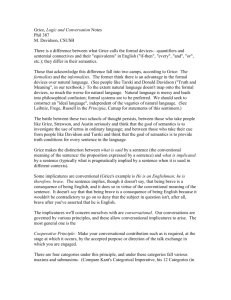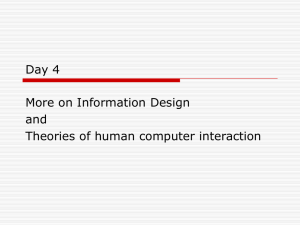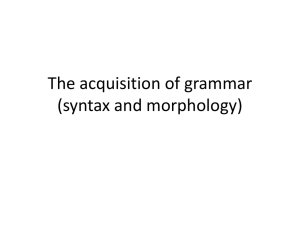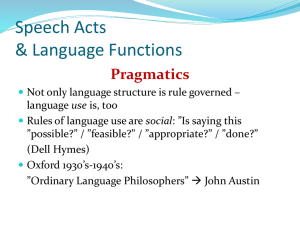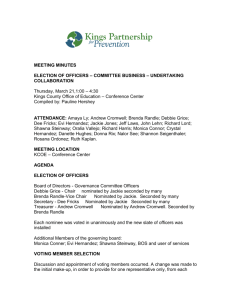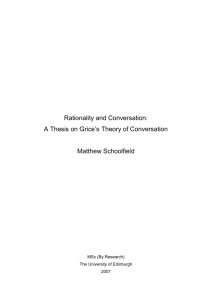Grice`s philosophy of language – at least the part that we focus on
advertisement
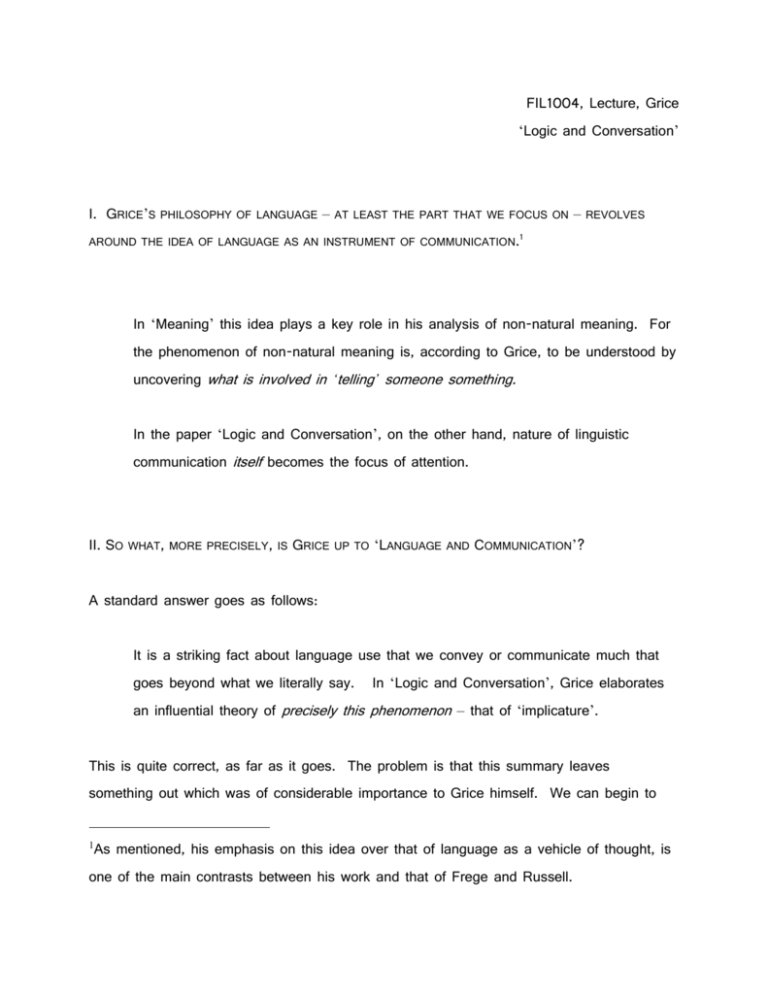
FIL1004, Lecture, Grice ‘Logic and Conversation’ I. GRICE’S PHILOSOPHY OF LANGUAGE – AT LEAST THE PART THAT WE FOCUS ON – REVOLVES AROUND THE IDEA OF LANGUAGE AS AN INSTRUMENT OF COMMUNICATION. 1 In ‘Meaning’ this idea plays a key role in his analysis of non-natural meaning. For the phenomenon of non-natural meaning is, according to Grice, to be understood by uncovering what is involved in ‘telling’ someone something. In the paper ‘Logic and Conversation’, on the other hand, nature of linguistic communication itself becomes the focus of attention. II. SO WHAT, MORE PRECISELY, IS GRICE UP TO ‘LANGUAGE AND COMMUNICATION’? A standard answer goes as follows: It is a striking fact about language use that we convey or communicate much that goes beyond what we literally say. In ‘Logic and Conversation’, Grice elaborates an influential theory of precisely this phenomenon – that of ‘implicature’. This is quite correct, as far as it goes. The problem is that this summary leaves something out which was of considerable importance to Grice himself. We can begin to 1 As mentioned, his emphasis on this idea over that of language as a vehicle of thought, is one of the main contrasts between his work and that of Frege and Russell. 2 see that something is missing by noting that Grice describes his paper as an enquiry …into the general conditions that, in one way or another, apply to conversation as such, irrespective of its subject content. Grice’s paper is, in fact, more properly described as having a three-fold aim: 1. To contribute to our understanding of the nature of linguistic communication in general. 2. To show that some of the general features of communication, serve to shed light on one of its most important sub-species - communication by ‘implicature’. 3. Finally, to show that understanding the nature of the communicative use of language is of wider philosophical significance - insofar as it can serve to settle philosophical debates that are not about conversation as such. Grice takes these points almost in reverse order. More precisely, he begins with (3) – how issues about communication bear on other philosophical issues – and then goes on to tackle (1) and (2) jointly. III. THE WIDER PHILOSOPHICAL SIGNIFICANCE OF UNDERSTANDING THE NATURE OF CONVERSATION. The specific issue which Grice takes up concerns the relation between the meaning of the ‘logical constants’ as they appear in the formal language of propositional- and predicatelogic and their analogs or counter-parts in natural language. 3 When introduced to formal logic, most people find that the meaning of the material conditional (as explained by its truth-table) is quite different from the meaning of the expression ‘If…then…’ as it occurs in natural language. The philosophers that Grice labels ‘formalists’ and ‘informalists’ agree that there are such differences but disagree over what consequences to draw from them. ‘Formalists’ – very roughly – think ‘so much the worse’ for natural language, whilst ‘informalists’ think that the divergences point to a severe limitation in the usefulness of formal languages and formal approaches. (See Grice’s own discussion.) Grice’s view is that both parties are mistaken in their assumption that there are such divergences in meaning, and that the mistake arises from ‘an inadequate attention to the nature and importance of the conditions governing conversation’ (p._). In other words, Grice thinks that apparent differences in meaning, such as those between the material conditional and the natural language ‘if…then…’ can be shown to be illusory by appealing to the ideas put forward in the paper: the idea that talk exchange is governed by the Cooperative Principle as well as the conversational maxims. Like Grice himself, I leave it as an exercise for the reader, to think through how the ‘reconciliation’ is to be effected. IV. GRICE’S OVER-ALL PICTURE: LANGUAGE USE AS THE RATIONAL ACTIVITY PAR EXCELLENCE. Grice has a distinctive over-all conception of language and speech. Knowing the outlines of his general picture can – I think - can be of help both in understanding his more detailed contributions, and in beginning to assess them. 4 The overall conception that Grice is promoting, and whose details are fleshed out in his various papers, is highly rationalistic. Indeed, it is arguably one that sees language use as the rational activity par excellence. On this picture, it would appear that, among the various activities that humans engage in, in their daily lives, language use draws on our intellectual capacities in an almost unrivalled way. Consider first, the following (relatively) uncontroversial claims about language use: 1. When communication is successful it results in knowledge: the hearer will have understood the speaker as he or she intended to be understood. (The hearer knows what the speaker meant by his or her utterance.) 2. Linguistic communication depends - to some extent - on speakers and hearers knowing the meanings of the expressions of the language they use. The picture that Grice is urging us to adopt, goes beyond the uncontroversial one both with respect to (1) the kinds of knowledge involved in linguistic communication, and not least (2) how it is employed. This is also where the rationalist aspect of Grice’s overall view comes into the picture. He claims that: The knowledge which comes about through successful communication is the upshot of the collaborative use – by speaker and hearer – of prior mutual knowledge. Mutual knowledge is, roughly, knowledge that is both shared and known by each party to be shared. 5 In linguistic communication, speakers and hearers draw on knowledge of: (1) the conventional meaning of the words used, together with the identity of any references that may be involved; (2) the Cooperative principle and its maxims; [i.e. ‘the general conditions that, in one way or another, apply to conversation as such’] (3) the context, linguistic or otherwise, of the utterance; (4) other items of background knowledge; and (5) the fact (or supposed fact) that all the relevant items falling under the previous headings are available to both participants and both participants know or assume this to be the case. (The list is taken from Grice’s account of the data on which a hearer relies in working out that a particular conversational implication is present [Martinich, p.170]. However, it should, on reflection, be clear that all items on the list are at least potentially relevant in any conversational exchange, for which reason speakers and hearers need to take them into account.) V. THE CENTRAL AIM OF ‘LOGIC AND CONVERSATION’ 6 We can see ‘Logic and Conversation’ as filling out important details of the general conception just outlined. In particular, Grice is concerned with (1) articulating one of the ‘bodies of knowledge’ on which communication depends - the Cooperative principle and its maxims - and (2) with showing it serves to explain the extremely important phenomenon of communication by ‘implicature’: how we manage to communicate something that is distinct from what we literally say. From here on, I shall follow the order of exposition in Grice’s paper. A. ‘Implicatures’: distinct from, and not logically implied by, ‘what is said.’ A and B are talking about a mutual friend C, who is now working in a bank. A asks B how C is getting on in his job, and B replies, ‘Oh quite well, I think; he likes his colleagues, and he hasn’t been to prison yet.’ B would appear to be implying or suggesting something, but for all we know at the present moment, it could be any number of things. What Grice wants to emphasise is that: whatever B implied, suggested, meant, etc., in this example, is distinct from what B said, which was simply that C had not been to prison yet. A little later, he makes the point that implicatures are not only distinct from what is said, they are also not logically implied by what is said (alone). B. From the manner in which implicatures are introduced, it is clear that we need a handle on the notion of ‘what is said’ by an utterance. 7 Grice uses this phrase so that ‘what someone has said…is closely related to the conventional meaning of the words (the sentence) he has uttered. He takes as his example, an utterance of the sentence ‘He is in the grip of a vice’, and goes on to say: Given a knowledge of the English language, but no knowledge of the circumstances of the utterance, one would know something about what the speaker had said, on the assumption that he was speaking standard English, and speaking literally…. …for a full indentification of what the speaker had said, one would need to know (a) the identity of x, (b) the time of utterance, and (c) the meaning, on the particular occasion of utterance, of the phrase “in the grip of a vice”. C. Conventional and Conversational implicatures. A little later, Grice distinguishes between what he calls conventional and conversational implicatures. 1. In the case of conventional implicatures, ‘the words used will determine what is implicated, besides helping to determine what is said’. Nevertheless, 8 conventional implicatures’ are not logically implied by what is said. (Grice says very little about ‘conventional implicatures’, and what he says is not entirely clear. He is mainly interested in the conversational implicatures.) 2. Conversational implicatures are a ‘sub-class of non-conventional’ implicatures. Their distinguishing feature is that they are …essentially connected with certain general features of discourse [and so not determined by the conventional meaning of the words used, or not by them alone] Of these too, the point holds that they are not only distinct from what is said, they are also not logically implied by what is said. D. The Cooperative principle and its maxims. Grice’s opening insight is that conversations are characteristically collaborative undertakings, directed toward some shared goal. As he puts it: Our talk exchanges do not normally consist of a succession of disconnected remarks, and would not be rational if they did. They are characteristically, to some degree at least, cooperative efforts; and each participant recognizes in them, to some extent, a common purpose or sets of purposes, or at least a mutually accepted direction. In light of this, he suggests that there is a quite general principle ‘which participants will be expected (ceteris paribus) to observe, namely’: 9 Cooperative principle: Make your conversational contribution such as is required, at the stage at which it occurs, by the accepted purpose or direction of the talk exchange in which you are engaged. Furthermore, he goes on to suggest that there are a number of more specific maxims and submaxims ‘the following of which will, in general, yield results in accordance with the Cooperative Principle’: (1) Maxims of Quantity a. Make your contribution as informative as is required for the current purposes of the exchange. b. Do not make your contribution more informative than is required. (2) Maxims of Quality a. Try to make your contribution one that is true: (i) Do not say what you believe to be false. (ii) Do not say that for which you lack sufficient evidence. (3) Maxim of Relation a. Be relevant. (4) Maxims of manner 10 a. Avoid obscurity of expression. b. Avoid ambiguity. c. Be brief. d. Be orderly. Grice is very explicit that this is intended only as a first approximation of the rules of cooperative conversation. For one thing the maxims are stated as if the purpose of talk or talk-exchange were always ‘a maximally effective exchange of information.’ So the scheme needs to be generalized in order to allow for such common purposes as influencing or directing the actions of others. Furthermore, he points out that some maxims may turn out to be reducible to other maxims (e.g. 2. maxim of quantity may be reducible to that of relevance), and that other maxims may have to be added. Finally, he also makes clear that the maxim he says least about – that of relevance – is the one that it is perhaps most difficult to get clear about. Just some brief remarks about why this is so. There are a number of ways in which a given contribution can be ‘relevant’ at a given stage of a conversation. Suppose that my conversation partner has made an assertion. Intuitively, any of the following kinds of response would seem to be relevant. I might respond by attempting to refute the assertion. Or I might respond by offering some amendment, clarification or qualification to her assertion. I might respond by making a conversational move that, as it were, sets the stage for a forthcoming clarification, refutation or amendment. For example, I might raise questions about some presupposition of the assertion, or about some bit of evidence that tends to support the assertion. On the other hand, I might respond by drawing an inference on the basis of the assertion. What is it that a refutation, clarification, amendment, or inference all share such that each is relevant to a given assertion? You might think that a contribution is relevant only if it preserves the topic or focus of the conversation. But – as Grice himself points out – conversations often shift focus and move from topic to topic. So just what counts as being relevant, is very difficult to say. (The starting point of Sperber and Wilson’s Relevance Theory.) 11 E. The role of The Cooperative principle and its maxims in generating conversational implicatures. To get a grip on what is going on, we need to think about how the Cooperative principle and its maxims are related. It would be natural to think that the maxims ‘articulate’ what is involved in adhering to the Cooperative Principle. (What it means to be ‘cooperative’) If so, the suggestion would be that a cooperative conversational partner is one whose contributions to the conversation conform, at every stage, to the maxims. That is, at every stage, the co-operative partner makes a contribution with is as informative as it needs to be, warranted, relevant, and perspicaciously expressed. But this is in fact not quite right – and the possibility of a number of cases of communication by implicature in fact depend on this not being the correct way of understanding the relation between the Cooperative Principle and its Maxims. (What Grice says about the maxims is that following them ‘will, in general, yield results in accordance with the Cooperative Principle’. That is to say that one way – this the ‘normal’ or standard case, as it were - of being Cooperative is by following the maxims. But there are others.) When it’s time for him to say what the connection is between the Cooperative Principle and maxims, on the one hand, and conversational implicature on the other, Grice begins by noting various ways in which a participant in a conversation may fail to fulfil a maxim: 1. He may quietly and unostentatiously violate a maxim. (Deliberately lying, for example.) 12 2. He may opt out from the operation both of the maxim and of the Cooperative Principle. (He may say, for example, ‘I cannot say more, my lips are sealed.’ 3. He may be faced with a clash. (Be unable to fulfil one maxim without violating another. Informativeness versus adequate evidence, for example.) 4. He may flout a maxim; that is, he may blatantly fail to fulfil it. According to Grice, situations of the last kind characteristically give rise to conversational implicatures, and these are the ones he spends most time explaining (2 ½ pages). In these case, Grice says, a maxim is ‘violated’ as a way of generating a conversational implicature. By ‘flouting a maxim’ Grice actually means something more than blatantly failing to fulfil it. Rather, he takes it to be a matter of failing to do so, in a situation in which …the speaker is able to fulfil the maxim and to do so without violating another maxim (because of a clash), is not opting out, and is not, in view of the blatancy of his performance, trying to mislead. In such a situation, Grice says, the hearer is faced with the problem of figuring out how the speaker’s saying what he did say can be reconciled with the supposition that he is observing the overall Cooperative Principle? And figuring out the answer to that question is tantamount to understanding what it is that the speaker is conversationally implicating. 13 Here is Grice’s first example of flouting a maxim for the purpose of getting in a conversational implicature: A is writing a letter of reference about a student who is applying for a philosophy job, and A’s letter reads as follows: ‘Dear Sir, Mr. X’s command of English is excellent, and he has been attending classes regularly. Yours, etc.’ Solving the problem of reconciling the violation of the maxim of sufficient informativeness with A’s observation of the Cooperative Principle: A cannot be opting out, since if he wished to be uncooperative, why write at all? He cannot be unable, through ignorance, to say more, since the man is his pupil; moreover, he knows that more information than this is wanted. He must, therefore, be wishing to impart information that he is reluctant to write down. This supposition is tenable only on the assumption that he thinks Mr. X is not good at philosophy. This, then, is what he is implicating. It is important for Grice that conversational implicatures be capable of being worked out by the audience. This is not to deny that we sometimes ‘intuitively grasp’ what a speaker implicates. But, according to Grice, the intuitive grasp must always be replaceable by an argument. (If not, it would be a conventional implicature, at best.) In particular, Grice supposes that conversational implicatures are deductive consequences of premises about what a speaker explicitly says on an occasion, together with certain 14 additional premises. More precisely, conversational implicatures follow from premises about: (1) the conventional meanings of the speaker’s words; (2) the Cooperative principle and its maxims; (3) the context, linguistic and non-linguistic, of the utterance; (4) other items of background knowledge – including matters about the speaker’s likely goals and desires. Furthermore, as noted earlier, it is important that (1) – (4) be matter of mutual knowledge (knowledge that is both shared and known by each party to be shared). ‘Thumbnail characterisation of conversational implicature’: What is conversationally implicated, according to Grice, is what must be the case if what has been said by the speaker is to be consistent with the assumption that he or she is in fact abiding by the cooperative principle. Grice’s more formal characterization of conversational implicature A, by saying that p conversationally implicates that q provided that: (1) A can be presumed to be obeying the cooperative principle. (2) The supposition that A is aware (or believes) that q is required in order to make A’s saying that p consistent with the assumption of co-operativeness. (3) A believes, and would expect the hearer H to think that A believes, that it is within the competence of H to calculate that the supposition of q is required to preserve A’s compliance with the cooperative principle.
